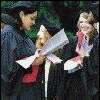 |
|
For the first time, international legal scholars -- federalists and sovereigntists -- analyze (and applaud) the Supreme Court ruling on the Quebec secession reference in latest issue of York U.'s Canada Watch
The publication, a journal of analysis on key national issues published by York's Centre for Public Law and Public Policy and York's Robarts Centre for Canadian Studies, flows from a gathering at York's Glendon College campus last November. To explore what may turn out to be the most important judgment in the Supreme Court's history, Canada Watch brought together fifty leading scholars, government policy makers, lawyers and commentators.
Said York's Osgoode Hall Law School Professor Patrick Monahan, who is also Director of York's Centre for Public Law and Public Policy: "We can report that the vast majority of the participants at the Glendon meeting gave the Court extremely high marks for producing a balanced and carefully nuanced judgment. Our participants were particularly impressed that the Court denied total victory to both sides while allowing each to avoid the humiliation of a total defeat."
Daniel Drache, York University Political Science Professor and Director of the Robarts Centre for Canadian Studies, said the significance of the Supreme Court of Canada's pivotal ruling on the Quebec Secession Reference is given full examination in 23 papers -- 18 domestic, five foreign, and five published in French -- in this issue of Canada Watch. He added that the publication is the first detailed evaluation to appear in English or French by leading experts from all sides of the debate.
"This Canada Watch contains the first published views on the matter from members of the international legal community. It also provides a panoply of perspectives from lawyers, scholars and politicians from across the country on one of the key questions around this chronic but evolving constitutional, political and economic issue," said Drache.
The Canada Watch contributors explore such questions as the role of provincial legislatures, the duty to negotiate, the right to participate in negotiations, Quebec's sovereignty project and Aboriginal Rights, and Anglophone Media and the Court's Opinion.
York's Osgoode Law School Dean Peter Hogg writes that the "the stunningly new element that the Supreme Court of Canada added to the constitutional law of Canada in its opinion" is the recognition that Ottawa and Quebec have a constitutional "duty" to negotiate secession based on a clear majority "Yes" on a clear question. Hogg elaborates, however, that as a matter of strict law, it is difficult to discern the source of the obligation since "the vague principles of democracy and federalism ...hardly seem sufficient to require a federal government to negotiate the dismemberment of the country that it was elected to protect."
Monahan and Drache said that most commentators at the symposium -- regardless of their sympathies or sensibilities -- agreed that this "duty" was a positive contribution to the ongoing issue.
Some of the best legal minds from France, Belgium and across Canada were among the symposium participants, including the likes of Bloc Quebecois MP Daniel Turp, York University Professor Ken McRoberts, Senior Fellow in Canadian Studies at the Fraser Institute Gordon Gibson, Saskatchewan's Donna Greschner (a member of the legal team for that province's intervention in the Quebec Secession Reference), and Stanley Hartt, Chairman of Salomon Smith Barney Canada Inc. and former chief of staff to Prime Minister Brian Mulroney.
A list of the papers' titles and their authors is attached. For a copy of Canada Watch, please contact Cheryl Dobinson at the Robarts Centre: (416) 736-5499.
For more information, please contact:
Sine MacKinnon
1. In Search of Plan A - by Daniel Drache and Patrick J. Monahan |
|
|
| | Welcome to York University | Latest Release | Release Archives | |
![[to York's Home Page]](../../images/yorklogos.gif)
